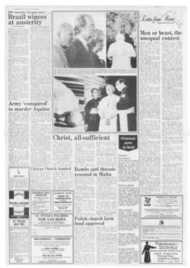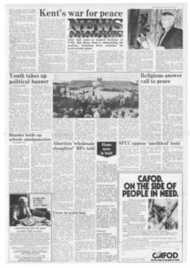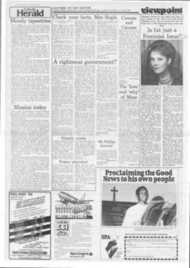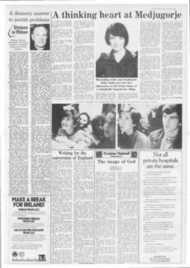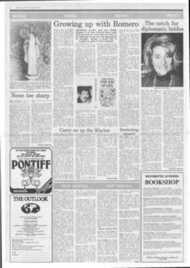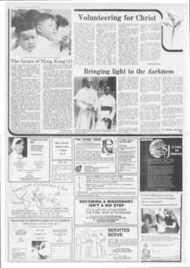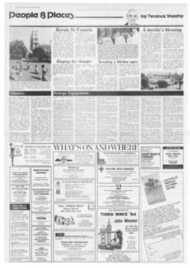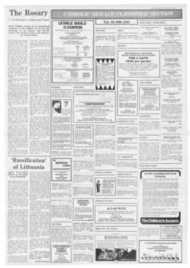Page 5, 19th October 1984
Page 5

Report an error
Noticed an error on this page?If you've noticed an error in this article please click here to report it.
Tags
Share
Related articles
Novels Of Robert Hugh Benson
Remarkable Prophecies Of Mgr R. H. Benson
New 'life' Of R. H. Benson
Confessions Of An Obnoxious Convert
Henry Harland Was Born 100 Years Ago
Writing for the conversion of England
AN ALMOST forgotten writer of nineteenth century England, Mgr R. H. Benson was born on November 18, 1871, and died exactly 70 years ago on October 19, 1914.
Robert Hugh Benson was the son of a distinguished Anglican churchman, Edward White Benson, who became the first Bishop of Truro, then Archbishop of Canterbury. Archbishop Benson married his cousin, Mary Sidgwick, described by Gladstone as "the cleverest woman in Europe". Of their six children , four survived childhood and achieved distinction, including, of course, Hugh himself.
Hugh followed initially in his father's footsteps, becoming a moderate High Church clergyman. But he became restless in the Anglican Church, and after a period in the Community of Resurrection (the Mirfield Fathers), became a Catholic in 1903.
He was ordained in 1904, and spent more than three years ministering in Cambridge. But in 1908 he bought his own home, Hare Street House, Buntingford, in Hertfordshire, and it became his base for the rest of his life.
When he died, he bequeathed it to the Archbishops of Westminster, and it is today, therefore, the country residence of Cardinal Hume.
Fr Benson (he became a Papal Chamberlain with the title of Mgr in 1911) was much in demand as a preacher, and wrote a number of spiritual works. But it is his novels which made him famous, more than anything, and he wrote 19 of them.
Their popularity has not lasted, and it is not difficult to see why. Most of them are narrowly Catholic in outline, and appealed to the ghetto mentality of Catholics in England at that time — a beleagured minority who saw it as their duty to show Protestants the error of their ways.
In this climate Benson's popularity was assured. He was a distinguished convert; he was distinctly unecumenical; both in his preaching and his novels (". . . there were two kinds of religion in the world, the true and the false — that is to say, the Catholic religion and the other one" he writes in Come Rack! Come Rope!, a historical novel about a young Catholic martyred for his faith in Reformation England); and his greatest zeal was for the conversion of England back to Roman Catholicism.
Robert Hugh Benson's novels. were of a sensational nature, and they often dealt with the occult (The Necromancers, to my mind, has something of a formerday Dennis Wheatley about it).
There were certainly curious side-effects. After Benson's death four books were written "by" him, or rather by one Anthony Borgia, who claimed Benson "dictated" them from beyond the grave.
Another, more sinister oddity, was Benson's growing terror, in his last days, of being buried alive. He demanded to be buried in a brick vault with a door to which only he had the key.
It would be impossible to conduct any discussion on Benson's writings without mentioning the strong influence of Frederick Rolfe, the selfstyled Frederick, Baron Corvo, whose most famous novel, Hadrian The Seventh, almost certainly influenced Benson's futuristic novel, Lord of the World, which foretells the end of the world in the twenty first century.
Benson became a great admirer of the writings of the impecunious Rolfe, and struck up a great friendship with him. Rolfe saw his chance of fame when the two agreed to collaborate on a biography of St Thomas of Canterbury. But counsels in the form of Bishop (later Cardinal) Francis Bourne, Mgr Arthur Barnes and Hugh's brother A C Benson advised Hugh strongly against such a collaboration, Hugh allowed himself to be swayed by their advice, and wrote to Rolfe suggesting that only his (Benson's) name appear on the title page.
Rolfe died in 1913, almost exactly a year before Benson, but is now remembered. Benson, who took refuge in respectability managed to survive Modernism but not the second Vatican Council.
Now he is best remembered only in connection with biographies of Rolfe. That, you might say, is poetic justice.
Christopher Rails
blog comments powered by Disqus



